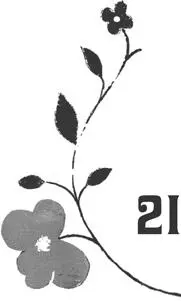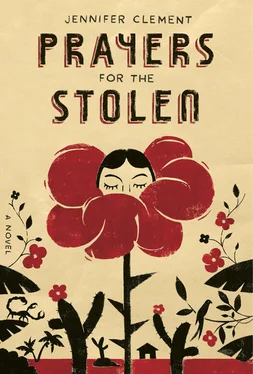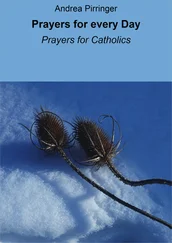The woman who shared my cell was also dressed in beige and was so small her sweatpants were rolled up around her ankles so she wouldn’t trip. Her hair was pulled into a long black braid down her back and, when she turned toward me, I could see her left sleeve hung loose and empty, falling from her shoulder as if it were a flag on a day without wind.
Since the moment I had been taken from the house in Acapulco and brought to the jail, I could not hear my mother’s voice. It had almost been forty-eight hours of silence. I heard the rush of my own blood through my body and it was the sound of Acapulco’s ocean.
When I looked at the tiny, childlike woman, my mother’s voice came back. Her words crossed the jungle, soared above the pineapple and palm trees, traveled over the mountains of the Sierra Madre, past the Popocatepetl volcano, down into the valley of Mexico City, and moved through the treeless streets straight into me.
So what the hell happened to your arm? I heard her ask.
Chop, chop, chop, the woman answered.
In a few moments I figured out that everything the woman said was plunk plunk this and splash splash that and clonk clonk, quack quack, bang bang.
I could hear my mother again. Right inside of my head she said, Well, well, well, look who’s here! It’s Miss Onomatopoeia herself!
Miss Onomatopoeia’s name was Luna and she was from Guatemala. She pointed up at the top bunk with the pointer finger of her right hand, her only hand, and told me the top bunk bed was for me. She had long and square fake acrylic fingernails pasted onto her real nails and each nail was painted black and white in a zebra pattern.
One woman from El Salvador was up there, but she left yesterday. I hope it’s clean, Luna said.
I am sure it’s fine.
Nothing in here is fine. All that woman ever said was God. She said God all day long as if the word were her heart beating.
A woman dressed in blue appeared and stood within the door frame. She was so large she blocked out much of the light from the corridor. She had short black hair and long fingernails that were painted yellow. She’d been sentenced. If you wore blue, you had no hope. If you wore beige you had hope.
So you killed the baby, she said. It was you.
I shook my head.
Touch the floor.
I paused for a second and she said it again, Touch the floor!
I crouched and touched the ground with my fingers.
You’re in jail, she said. I tell everyone who comes here to touch the ground as soon as they get here so they know exactly where they are. Now you have to decide if you left your pussy outside or if you brought it in here with you!
The woman moved to one side and the light from behind her body filled my cell. She smelled like blood and ink. She smelled like red and black. I was still crouched, touching the floor when she left.
Violeta, that’s Violeta. She’s killed two, no, three, no, four, no, many men. Bang bang, but with a knife, slice, slice, stab, stab. How many men?
Many. She tattoos everyone and loves jail because there’s so much skin in here.
The sunlight that fell through the narrow slat of the room’s window was cold.
I never knew the sun could be cold.
Luna explained there was no place to keep anything but that I could store my belongings in a space under her bottom bunk bed.
I have no belongings.
You will in time.
No. This is a mistake.
Did you kill her? You did, right?
I looked into Luna’s black eyes.
She was a small, dark brown Mayan Indian from Guatemala with straight black hair. I was a medium-sized, dark brown mix of Spanish and Aztec blood from Guerrero, Mexico, with frizzy, curly hair, which proved I also had some African slave blood. We were just two pages from the continent’s history books. You could tear us out and roll us into a ball and throw us in the trash.
What do you think? I asked.
What?
Think I killed that girl?
Of course not, she answered. They say here that it was an AK-47. You can’t know how to use one of those.
My mother’s voice echoed through me. I heard her say, This Guatemalan Indian is a piece of candy.
Luna said I could borrow any of her things except her toothbrush.
Even though it was only midday, I climbed up into the bed and lay down. The beauty parlor smell of the prison was concentrated up there. It smelled like acetone nail polish remover mixed with lemon hair spray. The unpainted concrete ceiling was a foot away from my face. If I turned over and lay on my side, I could scrape my shoulder and hip against the rough cement.
In jail everyone is missing something, Luna said.
I curled up and tried to forget I was cold. I didn’t have a blanket. If I wanted a blanket or pillow I had to buy it. Everything in jail had to be bought.
There was some graffiti written in black ink on the wall, exactly at my eye level and at the eye level of hundreds of women who had lain in the top bunk bed before me. Most of the graffiti consisted of lovers’ hearts with initials in them. Also, carved into the cement was the word Tarzan .
I closed my eyes. I could hear my mother say, So you had to go to jail and share a room with a one-armed Indian woman from Guatemala!
I also knew that even though we were proud to be the angriest and meanest people in Mexico, my mother could not stop crying because her daughter was in jail. The flies were drinking her tears.
When I thought of my house, I also knew that the drug trafficker’s blue plastic asthma inhaler was still lying in the green grass under the papaya tree. I knew it would lie there for hundreds of years.
I slept for the rest of the day and all through the night. The dawn light awoke me along with the new sound of traffic. It was the first time I had risen without hearing birds. It was raining outside, which made the cement walls and floor seem like walls and floors of ice.
During the night Luna had covered me with a blanket and a couple of towels. Small acts of kindness could turn me inside out. I never would have believed that someone who had shot a child in a break-and-entry robbery, killed twelve old ladies for their wedding rings, or murdered two husbands could loan me a sweater, give me a cookie, or hold my hand.
Luna had also placed my feet inside plastic supermarket bags so they would not get cold in the night.
Julio had said, Life is a crazy place where the drowned can be walking on dry land.
Now I knew he was right. It only took me one day to figure out that being in jail was like wearing a dress inside out, a misbuttoned sweater, or a shoe on the wrong foot. My skin was on the inside and all my veins and bones were on the outside. I thought, I better not bump into anyone.

I was tied to a train , the migrant train that goes from the south of Mexico to the US border, tied with a blue plastic clothesline, Luna said.
I could see her blood move through her veins and down her left arm and stop at the small stump, which was all that remained of her arm, like a tree limb that has been badly pruned with a dull saw.
I knew what Luna was talking about because Julio had told me that in Mexico there were two borders that cut the country into pieces. The horizontal border is the one between the United States and Mexico. The vertical border leads from Central America, through Mexico, and to the United States. Mostly men take the train from Central America to the border. It’s much cheaper. Women prefer taking the bus because it is safer. Julio, like everyone else, called the train The Beast.
Читать дальше













